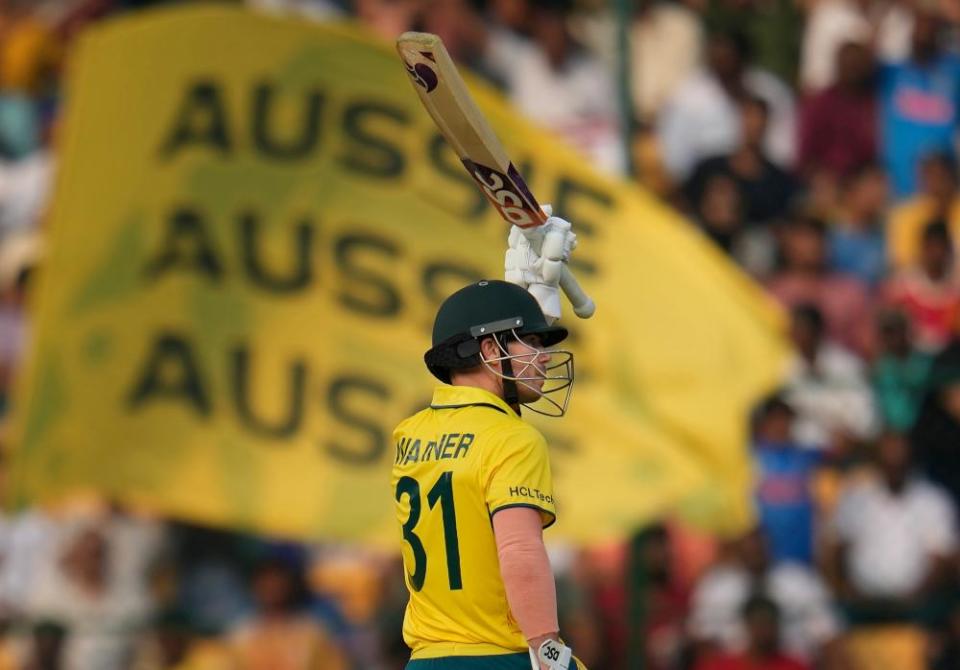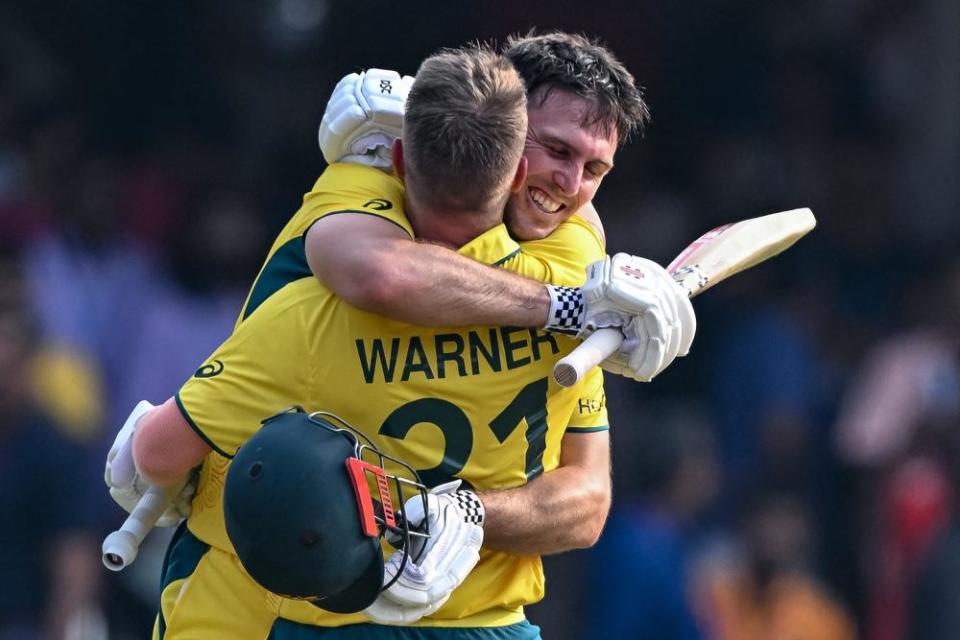David Warner’s latest Cricket World Cup knock secures place among ODI royalty

Friday in Bengaluru was one of those David Warner days. Sure, he got glitter-bombed by the Luck Fairy when he was on 10, his second attacking swing of the bat looping to mid on where it was wildly, impossibly dropped by Usama Mir. But from there he savaged Pakistan’s bowling with a purity of hitting well matched in power and variety.
His cut shots rasped through one side, his pull shots the other. One hybrid scooping pick-up stroke sent the ball 98 metres long and seemingly as high, ending with Warner on one knee outside his off stump and the ball hitting the top rim of the Chinnaswamy roof before bouncing back into the crowd. Better than anything, in a way, were the shots over long off and long on: simple straight arcs clearing the sight screen time and again.
Related: David Warner thunders Australia to crucial World Cup win over Pakistan
It wasn’t until he had 105 that there was another imperfect launch, this time a tough sprawling catch attempt for Abdullah Shafique at deep midwicket. On went Warner again to 163 before he finally found a safe pair of hands down the ground. A lesser player might have given 20 chances attempting the nine bombs that Warner launched into the stadium’s yellow seats or the 14 scorches along the ground to the boundary.
By then Mitchell Marsh was out for 119, putting on 259 in Australia’s second-biggest partnership at World Cups, beating another Warner effort with Steve Smith against an overwhelmed Afghanistan at the WACA in 2015. It was the second-biggest opening stand for any country, behind Sri Lankan ladder leaders Tillakaratne Dilshan and Upul Chandana. Warner’s 168 was his third World Cup score above 150, something no other player has done more than once.
It was, in short, another massive day out. Just as well for Australia, given Warner’s dismissal on 325 with 46 balls to go was followed by a batting subsidence, his teammates adding 42 runs and losing six wickets. Given how fiercely Pakistan set out after 368, eventually ending up all out 62 short but only after a bowling performance that lacked penetration for large parts of the night, Warner and Marsh can fairly claim credit for the win.
When cricketers have an extensive body of work across formats, Test careers tend to occlude the rest. Think of Kumar Sangakkara and people probably think of dreamy left-handed drives, a Test average of 57, more double tons than anyone but Bradman. His 14,234 one-day runs are an afterthought. Shane Watson is remembered for his wrestle with Test batting for mid-range results, not for having one of the best ODI chasing records in history. Think of Michael Bevan or Glenn Maxwell, though, with their scant Test opportunities, and their one-day careers stand out.

Warner falls into the first category. So much attention has fallen on his 109 Tests, from his blazing beginnings to his disciplinary breaches, his 25 tons, his Ashes wins and disasters, the sandpaper fiasco, his record home versus away. Next, focus falls on his 20-over career, the format from which he emerged as a prodigy, in which he has built a huge Indian fanbase, having missed only one IPL season since its inception, remarkably as an overseas player having made the third-most runs in the tournament.
Lost in the middle has been his work in one-day internationals, which deserves to be recognised as great. At a glance, his total of 154 matches looks a sliver compared to players with 300 or 400 in the heyday of the 1990s and early 2000s. Even in those matches, though, his mark of 21 centuries is second only to Ricky Ponting’s 29 for Australia (Ponting made another for a World XI charity match). Warner is seventh for Australian run-scorers, behind Ponting, Bevan, Adam Gilchrist, the Waugh brothers, and Michael Clarke. They played between 78 and 220 more matches than him. Of Australians with 1,000 runs, his average of 45.37 is behind only Bevan and Mike Hussey.
But as another massive World Cup innings grew on Friday, his work at the showpiece tournament stood out most. A couple of matches ago he went past 1,000 runs in World Cups, with this his third edition. There are currently 24 players in that group, some of whom played four, five, even six World Cups. It is a group of batting royalty.
Related: Australia beat Pakistan by 62 runs at Cricket World Cup 2023 – as it happened
Warner started the match against Pakistan on 1,057 runs and ended it on 1,220. Through one innings he went past 1996 final winner Aravinda de Silva, memorable World Cup fielder Herschelle Gibbs, New Zealand’s wise skipper Stephen Fleming, the eternal presence of Javed Miandad, the squash-ball maestro Adam Gilchrist, Sri Lankan artist Mahela Jayawardene and inventor Tillakaratne Dilshan, the stern brick outhouse Jacques Kallis, opening plunderers Sanath Jayasuriya and Chris Gayle, Bangladesh’s cranky superstar Shakib-al-Hasan, and the modern genius of AB de Villiers.
Now Warner sits seventh for runs in World Cup cricket. Brian Lara is five runs away, and beyond that is an intriguing contest with three other active players. Shakib is playing in this tournament and could still catch up. Rohit Sharma is 20 runs ahead on 1,243 and piling them up like it’s a stocktake sale. Virat Kohli is 79 ahead on 1,289 and as relentless as ever.
That’s a top-order trio of players in sparkling form going head-to-head over the next four weeks, with their eventual positions on that list influencing how their teams finish at the tournament. Further into the distance – 300 runs, 500 runs, 900 runs hence – sits the current podium of Sangakkara, Ponting and Sachin Tendulkar, a man who amassed 2,278 World Cup runs. The first two might be chaseable; Tendulkar is a distant lighthouse. Wherever that contest settles, it is pantheon company for Warner. His work in this format deserves its place.

 Yahoo Sport
Yahoo Sport 



































































